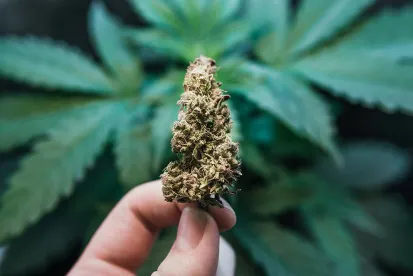In this article, we provide an update on the status of pending legislation we discussed in previous editions of the Native Affairs Quarterly, an overview of newly proposed and upcoming federal legislation involving cannabis, and details about how the American Rescue Plan Act’s allocations for Tribal governments could be utilized to benefit future or existing Tribal cannabis or hemp operations.
Federal Cannabis Legislation Update
There are several pieces of legislation pending before Congress that could have a significant impact on the cannabis industry:
-
The SAFE Banking Act of 2021, H.R. 1996, which was introduced in the previous Congress, would allow financial institutions and insurers to legally do business with the cannabis industry without fear of legal action by the federal government. It passed the House on April 19, 2021. It was received in the Senate and referred to the Committee on Banking, Housing, and Urban Affairs on April 20, 2021.
-
The Marijuana 1-to-3 Act of 2021, H.R. 365, would transfer cannabis from a schedule I to a schedule III drug under the Controlled Substances Act. It was introduced in the House on January 19, 2021 and referred to both the Committee on Energy and Commerce and the Judiciary Committee, which in turn referred the legislation to the Subcommittee on Health on February 2 and the Subcommittee on Crime, Terrorism, and Homeland Security on March 5, respectively.
-
The MORE Act of 2021, H.R. 3617, was reintroduced by Congressman Jerrold Nadler on May 28, 2021. The Act would end the criminalization of cannabis at the federal level retroactively and going forward. Cannabis arrests, charges, and convictions would be automatically expunged at no cost to the individual. However, cannabis could still be criminalized by individual states. The Act would also create the Office of Cannabis Justice to oversee the social equity provisions in the law. On July 7, the Act was referred to the Subcommittee on Conservation and Forestry for further discussion.
-
The Cannabis Administration and Opportunity Act, S. ___ would completely remove cannabis from the controlled substances list under the Controlled Substances Act and would allow states to implement their own laws regarding cannabis without fear of federal intervention. A discussion draft was released by Senators Schumer, Booker, and Wyden on July 14, 2021. The Senators are seeking feedback as they finalize the proposed piece of legislation.
As discussed in our Spring 2021 article, although the Democrats control both the House and the Senate (with Vice President Harris acting as the tie-breaking vote in the 50-50 Senate), passing any cannabis legislation in this Congress will be difficult. The filibuster rules require 60 votes for a bill to pass the Senate, so any cannabis legislation would need support from every Democratic Senator and ten Republicans.
The American Rescue Plan Act of 2021
In March, Congress passed the American Rescue Plan Act of 2021 (“ARPA” or “Act”), which allocated $20 billion to Tribal governments. Congress directed that $1 billion be allocated equally among eligible Tribal governments and the remaining $19 billion be allocated to Tribal governments in a manner determined by the Secretary of the Treasury. Of that $19 billion, 65% of these funds, or $12.35 billion, will be distributed based on pro rata, self-certified Tribal enrollment. Treasury will distribute the remaining 35% of these funds, or $6.65 billion, based on self-certified Tribal employment data. Tribal governments may be able to utilize some of these funds to benefit future or existing Tribal cannabis or hemp operations, as Tribes receiving ARPA funding have substantial discretion to use the funds in ways that best suit the needs of their citizens as long as the use fits into one of the following four statutory categories:
-
Responding to the COVID-19 public health emergency or its negative economic impacts;
-
Responding to workers performing essential work during the COVID-19 public health emergency by providing premium pay to the Tribal government’s eligible workers, or by providing grants to employers that have eligible workers who performed essential work;
-
For the provision of government services, to address the reduction in revenue of the recipient due to the COVID-19 public health emergency, relative to revenues collected in the most recent full fiscal year of the recipient prior to the emergency; or
-
To make necessary investments in water, sewer, or broadband infrastructure.
Tribes considering ways to positively impact their citizens through the use of ARPA funds could make the following investments—while not directly related to cannabis or hemp—to benefit future or existing Tribal cannabis operations.
-
Education – one of the eligible uses for ARPA funds is to address educational disparities. Tribes receiving funds could invest in science and business courses for their local high school or vocational schools. These types of courses are critical for any Tribal member that wants to own, operate, or work at a small business, such as a Tribal cannabis operation.
-
Infrastructure – the ARPA provides broad allowances for investments in infrastructure, including water, sewer, and broadband. Investments in each of these areas could provide dividends for Tribal economic development and small businesses, such as cannabis or hemp operations. In addition, water infrastructure projects would also benefit agricultural uses.
-
Small Businesses – ARPA funds can also be used to assist small businesses, including loans, grants, in-kind assistance, technical assistance, or other services, that addresses the negative economic impacts of the COVID-19 public health emergency. Tribes can explore the availability of these funds for cannabis or hemp related businesses.
While the future of federal legislation legalizing cannabis remains unclear, Tribes that are interested in the cannabis industry can start taking steps toward establishing the necessary framework for this area of Tribal economic enterprise.





 />i
/>i

